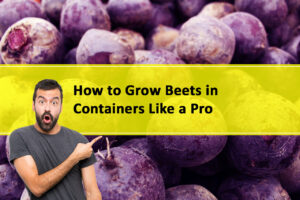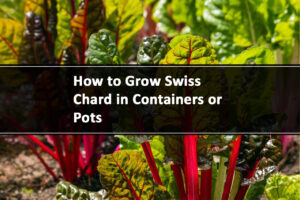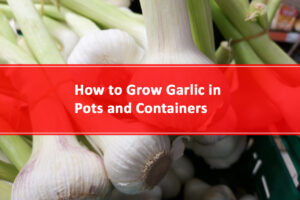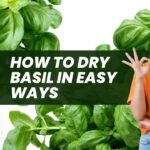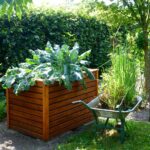Beautiful Plants For Your Interior
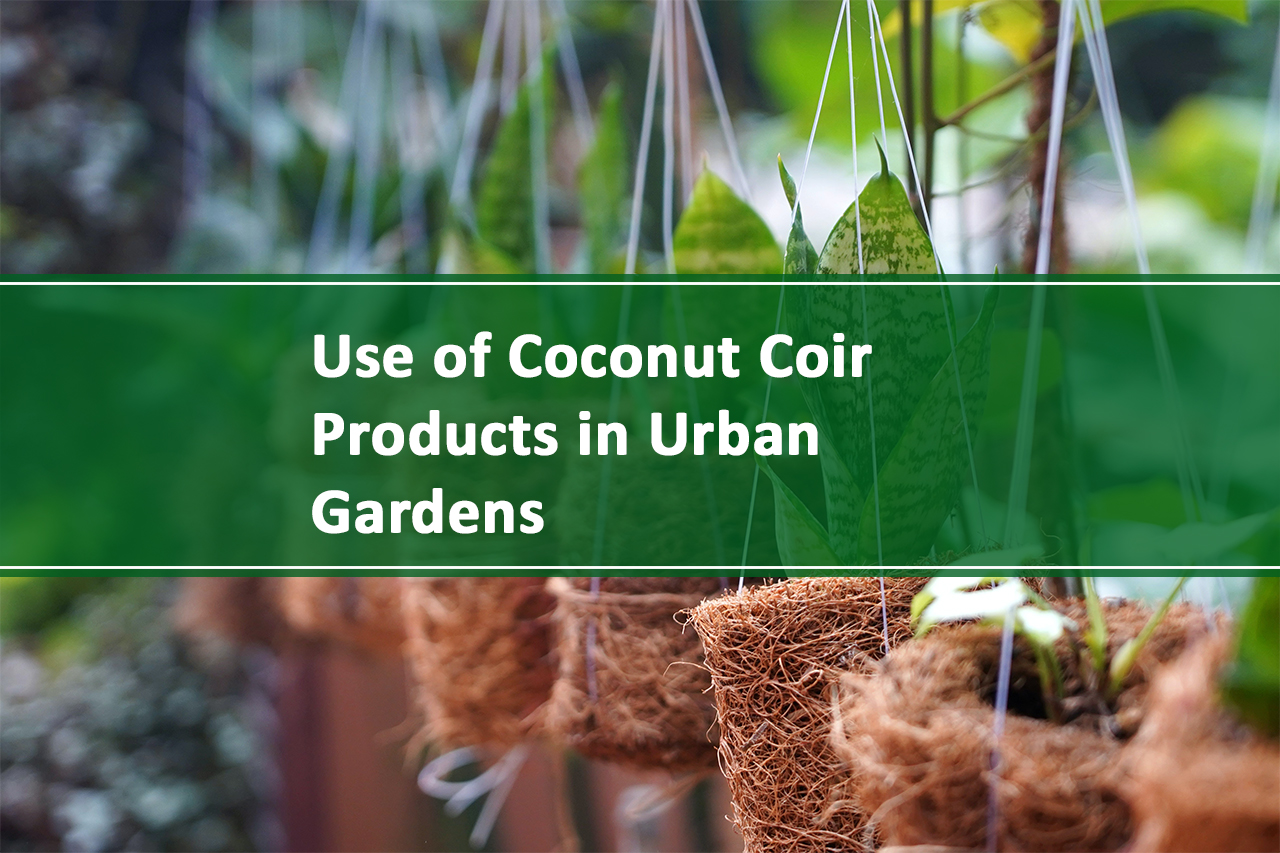
The Use of Coconut Coir Products in Urban Gardens
The use of coconut coir products in urban gardens has grown in popularity as more people look for environmentally responsible and sustainable methods to raise their own food and enhance their living environments.
Urban people are battling a lack of available garden area, a lack of resources, and environmental concerns. Creative gardening solutions have evolved, with coconut coir taking the lead as a flexible and long-lasting growing medium. The advantages and uses of items made from coconut coir are explored in depth in this article, emphasizing how they may make urban gardening a successful, environmentally friendly endeavor.
What is Coconut Coir?
Before delving into the applications of coconut coir in urban gardening, it’s essential to understand what it is and how it is derived. Coconut coir is a natural fiber extracted from the husk of coconuts, which are the fruits of the coconut palm (Cocos nucifera). The coir fibers are a byproduct of coconut processing, making them a sustainable and eco-friendly choice for gardening applications.
Coconut coir is obtained through a multi-step process. Initially, the coconut husks are soaked in water to soften the fibers. Afterward, they are mechanically separated and beaten to extract the coir fiber. The extracted fibers are then washed and dried to reduce their moisture content. The final step involves compressing the coir fibers into various products such as coir pots, coir pellets, coir blocks, and coir matting.
The Growing Popularity of Urban Gardening
Urban gardening has become a global phenomenon as more people move to cities, leading to increased demand for locally sourced, fresh produce. However, limited space and environmental challenges pose significant barriers. The use of coconut coir products provides an ideal solution for cultivating healthy, abundant plants in urban environments.
As urbanization intensifies, people find themselves living in high-rise apartments, condominiums, and smaller homes with little to no access to traditional gardens. Consequently, individuals are seeking creative ways to integrate green spaces into their urban lifestyles. Urban gardening not only addresses the need for fresh produce but also contributes to improved air quality, community engagement, and mental well-being.
Benefits of Coconut Coir Products
1. Superior Water Retention:
One of the most significant advantages of coconut coir is its exceptional water retention properties. Coconut coir can hold up to 10 times its weight in water, providing a constant moisture supply to plants even in hot and arid climates. This water retention ability reduces the frequency of watering, saving water and time for urban gardeners.
2. Optimal Aeration:
Proper aeration is crucial for plant root health. Coconut coir has a unique structure that allows air to circulate within the growing medium, preventing soil compaction and ensuring sufficient oxygen reaches the roots. Improved aeration promotes robust root development and healthier plants overall.
3. pH Neutral:
Unlike peat moss, which is commonly used in gardening but has an acidic pH, coconut coir is pH neutral. This means it won’t alter the soil’s acidity, providing a stable environment for a wide range of plants. Gardeners can easily adjust the pH level according to the specific needs of different plant varieties.
4. Natural Weed and Pest Resistance:
Coconut coir contains lignin, a natural substance that deters weed growth and repels certain pests. This reduces the need for harmful chemical interventions, making coconut coir products an eco-friendly choice for pest management in urban gardens.
5. Renewable and Sustainable:
The production of coconut coir utilizes a byproduct of coconut farming, making it an environmentally friendly and sustainable gardening option. By using coconut coir, gardeners support a circular economy by recycling coconut waste into valuable products.
10 Types of Coconut Coir Products for Urban Gardens
1. Coconut Coir Pots:
These biodegradable pots are an excellent alternative to plastic pots. Coconut coir pots allow for seamless transplantation as the roots can easily penetrate the coir walls without causing harm to the plant. When transplanting, the entire pot can be placed into the new growing medium, minimizing root disturbance.
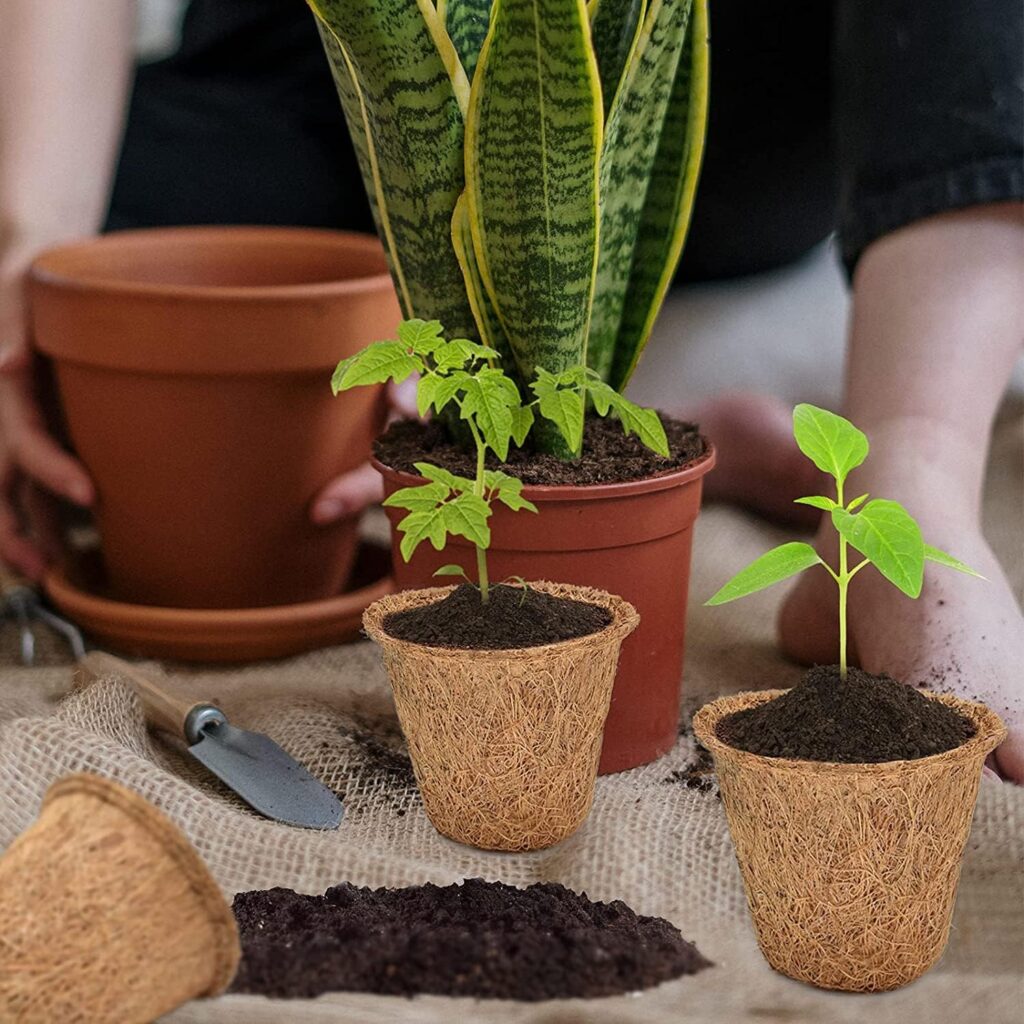
Grow Organiks Coir Planting Pots
Coconut Coir Pots are natural cultivation pots made from good-quality coconut fibers. Coir pots are environmentally safe and sustainable.
2. Coconut Coir Matting:
Coir matting provides an effective weed barrier when laid on the soil surface. It also helps with moisture retention and erosion control, particularly on slopes and hills. Additionally, coir matting can be used to line hanging baskets or container edges to enhance water retention and prevent soil loss.
3. Coconut Coir Pellets:
Coir pellets are convenient for seed starting and germination. They are compressed disks that expand when soaked in water, providing a perfect environment for young seedlings to thrive. Once the seedlings have developed strong roots, they can be transplanted into larger containers or directly into the ground.
4. Coconut Coir Blocks:
Compressed blocks of coconut coir are an efficient way to store and transport coir. When hydrated with water, these blocks expand to create an excellent, soilless growing medium. Coconut coir blocks are widely used in hydroponic and vertical gardening systems due to their lightweight and water-holding capacity.
5. Coconut Coir Fiber:
Coir fiber is obtained from the outer husk of coconuts. The husk is processed to separate the fibers, which are then used in various gardening applications. Coir fiber is often mixed with soil to improve its structure and drainage. It creates air pockets in the soil, allowing roots to breathe and reducing the risk of waterlogging. This is particularly beneficial for plants that prefer well-draining soil, such as succulents and cacti.
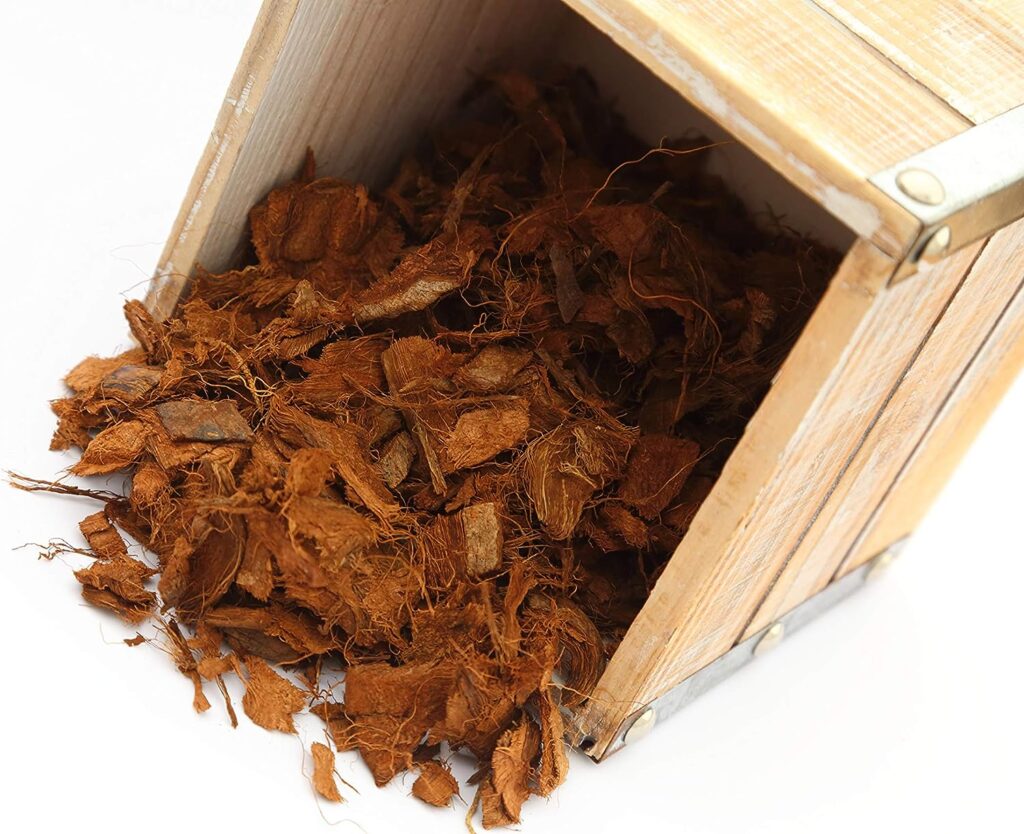
Premium Coconut Coir Fiber Husk Chips in a Brick
Coco coir husk chips, an organic and natural mulch, are made from coconut shells (husks), making them a highly sustainable alternative to other mulch options.
6. Coconut Coir Peat/Coir Pith:
Coir peat, also known as coir pith or coir dust, is a byproduct obtained after extracting coir fibers. It has a spongy texture with high water retention capabilities. When used as a soilless growing medium, coir peat can absorb and hold water well, providing a consistent moisture supply to plant roots. It is also pH-neutral, which means it won’t significantly alter the acidity or alkalinity of the soil.
7. Coconut Coir Chips:
Coir chips are larger pieces of coconut husk, typically used in potting mixes and as a growing medium for orchids and other epiphytic plants. The larger size of coir chips promotes better aeration and drainage, making it suitable for plants that require excellent air circulation around their roots.
8. Coconut Coir Hanging Baskets and Liners:
Coir-based hanging baskets and liners are environmentally friendly alternatives to traditional plastic versions. Coir fibers have excellent moisture retention properties, reducing the frequency of watering required for plants in hanging baskets. Additionally, the fibers promote healthy root growth and prevent root rot.
9. Coconut Coir Grow Bags:
Coir grow bags are long bags filled with coir substrate, often used in hydroponic or vertical gardening systems. They provide a clean and convenient medium for growing vegetables and other plants without traditional soil. Coir grow bags offer excellent water retention and aeration properties, ensuring the healthy development of plant roots.
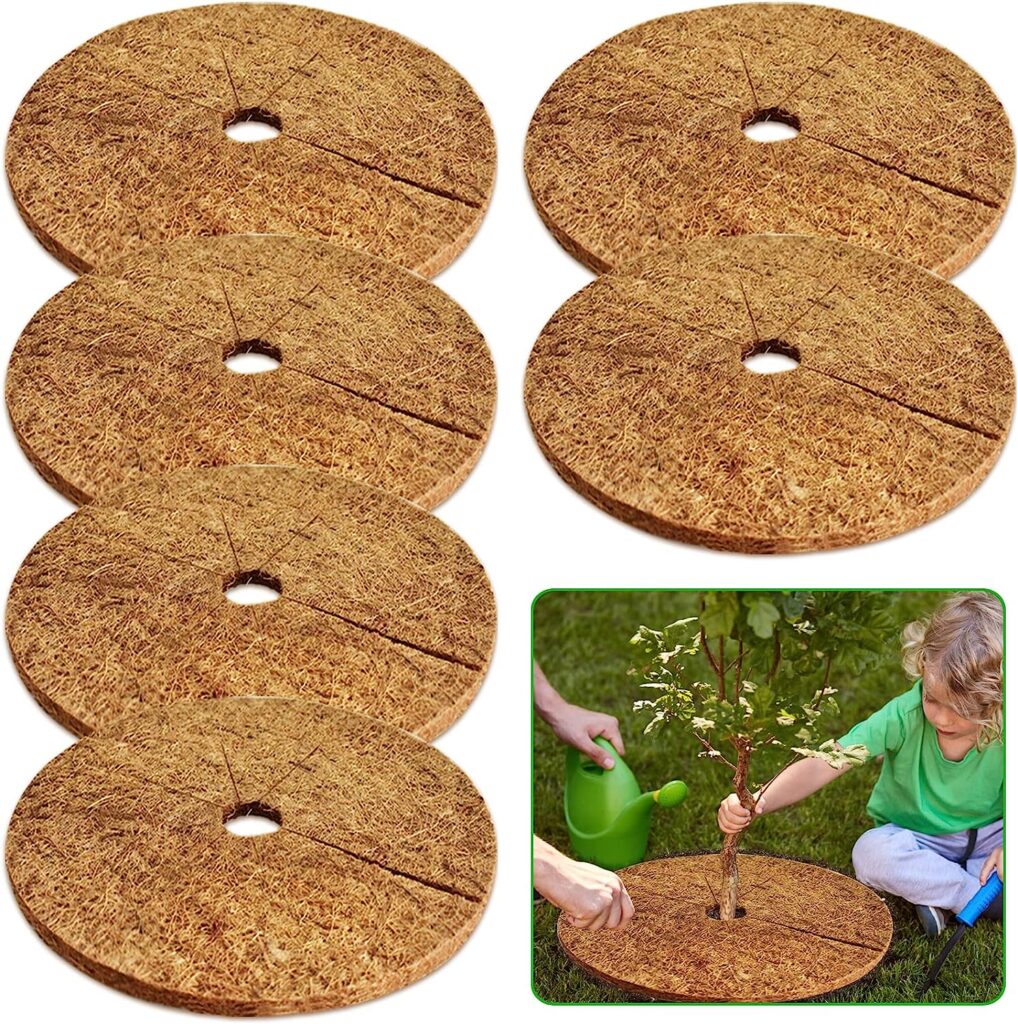
Coconut Fibers Mulch Ring Tree Protector Mat
These spherical coconut mulch rings are breathable, long-lasting, and composed entirely of natural coconut coir.
10. Coconut Coir Mulch:
Coir mulch is made from shredded coir fibers. It serves as an organic weed suppressant, preventing weed growth around plants and reducing the need for frequent weeding. Coir mulch also helps retain soil moisture, protecting plants from drought stress and reducing water evaporation from the soil surface.
Urban Garden Applications of Coconut Coir
Coconut coir is an ideal growing medium for raised bed gardens, offering a well-aerated and moisture-retentive environment for plants. In raised beds, coconut coir can be mixed with compost and other organic materials to create a rich and fertile growing medium that supports plant growth.
When space is limited, container gardening becomes a go-to option for urban gardeners. Coconut coir provides an excellent alternative to traditional potting mixes, ensuring optimal plant growth in containers. Its water retention capacity reduces the frequency of watering, making it ideal for busy city dwellers.
3. Vertical Gardening:
Vertical gardening has gained popularity in urban settings due to its space-saving potential. Coconut coir serves as an excellent medium for vertical planters, both indoors and outdoors, due to its lightweight nature and water-holding capacity. Vertical gardens are not only visually appealing but also improve air quality and insulation in urban environments.
4. Green Roofs:
Green roofs are an innovative way to incorporate nature into urban landscapes and combat the heat island effect. Coconut coir acts as a substrate for plants on rooftops, helping to insulate buildings, reduce energy consumption, and mitigate stormwater runoff. Green roofs also offer a habitat for urban wildlife and contribute to urban biodiversity.
How to Use Coconut Coir in Urban Gardens
Using coconut coir in urban gardens is a rewarding and sustainable approach to growing plants in limited spaces. Its excellent water retention, aeration, and pH-neutral nature make it an ideal alternative to traditional soil. Here’s a step-by-step guide on how to use coconut coir effectively in your urban garden:
-
Preparing Coconut Coir
Before use, coconut coir should be soaked in water to expand and loosen the fibers. Place the required amount of coir in a container and add water, ensuring that it is evenly distributed. Allow the coir to absorb the water and expand fully before use.
-
Seed Starting
Coconut coir pellets or coir blocks can be used for starting seeds. Fill the pellets or blocks with the coir medium and sow seeds as per the recommended depth. Ensure adequate moisture and provide proper light and temperature conditions for successful germination.
-
Transplanting
When transplanting, gently remove the plant from its pot, place it in the coconut coir-filled hole, and pat the coir around the roots to secure the plant. The coconut coir provides a stable and well-draining environment for the roots to establish quickly in their new location.
-
Mulching
Apply coconut coir matting around plants to conserve moisture and suppress weed growth. Mulching not only helps with moisture retention but also prevents soil erosion, especially on sloping surfaces. Coconut coir matting also acts as a natural weed barrier, reducing the need for chemical herbicides.
Tips for Successful Urban Gardening with Coconut Coir
1. Proper Irrigation:
Although coconut coir retains water well, it is essential to maintain a balanced watering schedule to prevent waterlogging and root rot. Regularly check the soil moisture levels and adjust the watering frequency accordingly, especially during hot and dry periods.
2. Nutrient Supplementation:
Coconut coir is a relatively inert growing medium, meaning it does not contain significant amounts of nutrients. To ensure optimal plant growth, gardeners should regularly feed their plants with organic fertilizers. Composted kitchen scraps or liquid organic fertilizers are excellent choices to supplement plant nutrients.
3. Composting:
Recycling used coconut coir products through composting is a sustainable way to enrich the soil and close the sustainability loop. Once the coconut coir breaks down in the compost pile, it releases valuable nutrients back into the soil, benefiting future plants and completing the circle of sustainability.
People also ask:
-
Can coconut coir be used for seed starting?
Yes, coconut coir is an ideal medium for seed starting. You can use coir pellets or coir blocks in seedling trays or pots. The fine texture of coir provides a supportive environment for germinating seeds and developing strong seedlings.
-
How does coconut coir improve water retention and aeration?
Coconut coir can hold up to 10 times its weight in water, ensuring a consistent moisture supply to plants. Its fibrous structure also promotes optimal aeration, preventing soil compaction and ensuring that roots receive sufficient oxygen.
-
Can coconut coir be mixed with soil?
Yes. Coconut coir can be mixed with existing soil to improve its structure and water retention capacity. A 1:1 mixture of coconut coir and soil is recommended for enhancing soil quality in small garden beds or containers.
-
Is coconut coir pH-neutral?
Yes, coconut coir is pH-neutral, unlike peat moss, which is acidic. This means it won’t alter the pH of your soil, allowing you to adjust the pH level according to the specific needs of your plants.
-
How often should I water plants grown in coconut coir?
Coconut coir retains water well, but it’s essential to monitor moisture levels and water levels accordingly. Depending on factors like plant type, weather conditions, and container size, you may need to water slightly less frequently compared to traditional soil.
-
Can coconut coir be used in vertical gardening?
Yes, coconut coir is suitable for vertical gardening. Its lightweight nature makes it an excellent choice for wall-mounted planters or hanging pockets. You can create vertical gardens in small spaces, utilizing coconut coir’s water retention properties for thriving plants.
-
Can I compost used coconut coir?
Yes. Used coconut coir can be composted along with other organic materials. As it breaks down, it releases nutrients back into the soil, contributing to the overall health of your garden.
Wrap up on the use of coconut coir
The use of coconut coir products in urban gardening, with a focus on the versatile coconut husk, has transformed how city dwellers cultivate plants in limited spaces. From superior water retention and aeration to its renewable and sustainable nature, coconut coir offers a host of benefits to both gardeners and the environment. As urban gardening continues to gain momentum, coconut coir presents a viable and eco-friendly option for greening our cities and reaping the rewards of bountiful harvests amidst the concrete jungle. Embrace the potential of the humble coconut husk, and let it nurture your urban garden into a flourishing green oasis.

